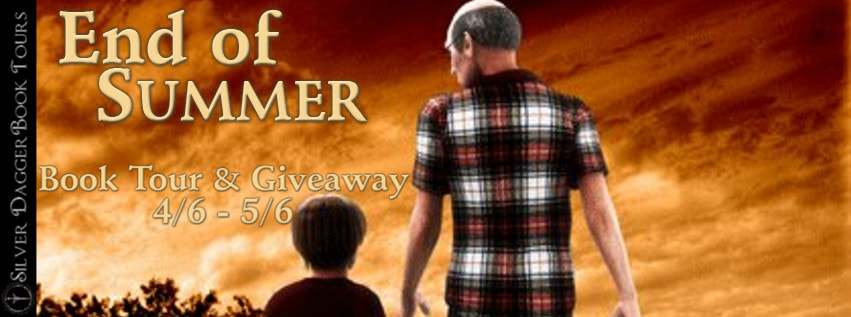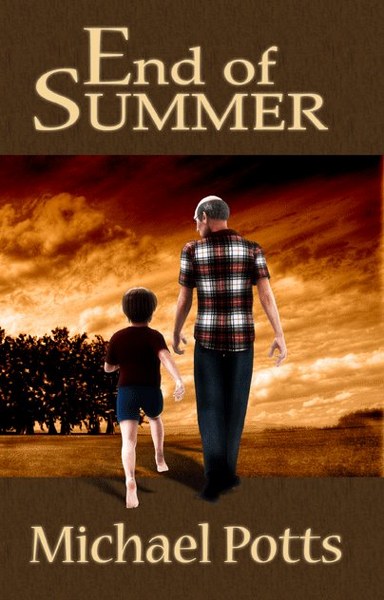END OF SUMMER by Michael Potts -- A young boy. An old man. And a journey of the heart.-- ***Spotlight -- Guest Post: Death anxiety in Literature -- Giveaway***
End of Summer
by Michael Potts
Genre: Coming of Age
A young boy. An old man. And a journey of the heart.
A middle aged man, Jeffrey Conley, has obsessive interests, including a fascination with death and the process of dying and a fetish for the sound of a woman's heartbeat. His wife, Lisa, encourages him to get help. His psychologist diagnoses him as having Asperger's Syndrome, a mild condition on the Autism spectrum. When his granny dies, Jeffrey returns to Tennessee for her funeral, and then walks the same field he walked with his granddaddy as a child. On that cold, late November day, Jeffrey walks toward The Thicket, an outcropping of trees and vines from the woods adjoining the field that crossed the fence and are invading the field. In that special place he and Granddaddy would sit and talk as Jeffrey swung on vines or sipped cola. The middle aged Jeffrey looks back to that time, to the summer of his ninth year, an idyllic year and a terrible year, a year of joy, a year of loss and grief. Will Jeffrey Conley be able to discover and understand his struggles by this journey back into his past. While remembering Sunday dinners with relatives, hunting rabbits with his granddaddy, or visiting the town square, Jeffrey rediscovers pain and the worst loss of his life. Will he be able to make sense of his life, his past, his obsessions, his faith? Or will he sink into despair, The Thicket becoming a place of pain rather than redemption? That is the fundamental problem of the book.
Guest Post
Death Anxiety and Literature
by Michael Potts
A history of literature from the late Victorian period up to the present reveals a number of writers who focus on death in some of their major works. Of course the major nineteenth century work is Leo Tolstoy’s The Death of Ivan Ilyich (1886). It is the first novel to directly confront the notion of “my death” from a first-person perspective. Death anxiety grew during this time period due to a loss of religious faith in Europe. The hopeful ending of Tolstoy’s novel reflects his life as a convert to Christianity. Fyodor Dostoyevsky, a convert from atheism to the Russian Orthodox Church, also was concerned with death and found the solution to the problem of death in terms of the Christian doctrine of the general resurrection of all human beings at the end of time.Twentieth century writers also reflected a concern with death. Miguel de Unamuno, a Spanish writer, focused on his fear of death as annihilation in his book, Tragic Sense of Life (1913). Unamuno was a man who struggled with religious faith all his life, and in the end was an agnostic. He struggled to find meaning in the face of a death that might well mean the total end of the self.
A splendid book by James Agee, A Death in the Family (1957), beautifully expresses the experience of a boy and his family concerning the sudden death of his father in an automobile accident. As a model of beautiful prose, this book has no equal, in my opinion. It is difficult for a writer to combine an economy of words with a combination of words that expresses lovely images, but Agee manages to succeed on both fronts. The book is not as much about death anxiety as it is about a family’s reaction to a death and a boy’s reaction to the loss of his father. Yet it shows how death haunts Agee to the point that he had to write a semi-autobiographical novel which is, in a sense, a tribute to his late father.
A short story with a main character who has a horror of death is John Updike’s “Pigeon Feathers” (1961). A young boy fears that death may be annihilation and desperately seeks proof of the existence of God. He finds such proof in an unusual way.
Ernest Becker’s nonfiction book, The Denial of Death (1974) focuses on death anxiety in a powerful way. His approach is psychodynamic; his writing is vivid, clear, and deeply disturbing.
My first novel, End of Summer (2011) is a Southern fiction novel with the theme of a boy dealing with death. Like me, he is obsessed with death and fears that his religion may be false and death nothingness. I think such fears drive some people to write. It is certainly a major factor in my own decision to write fiction as well as my decision to become a philosopher. In the end, I am Christian, and my view of death optimistic due to the hope of eternal life. To the modern world, that is superstition. Despite my doubts, to me, it is truth and goodness and beauty—and comfort.
 About the Author
About the Author
Michael Potts has taught philosophy at Methodist University since 1994. A native of Smyrna, Tenn., he received a B.A. in Biblical languages from David Lipscomb University in 1983, a M.Th. from Harding School of Theology in 1987, a M.A. in religion from Vanderbilt University in 1987, and a Ph.D. in philosophy from the University of Georgia in 1992. He is the author of Aerobics for the Mind: Practical Exercises in Philosophy that Anybody Can Do(Tullahoma, TN: WordCrafts Press, 2014) and has co-edited an anthology, Beyond Brain Death: The Case Against Brain Based Criteria for Human Death, published by Kluwer Academic Publishers in 2000. He has twenty-five articles in refereed scholarly journals, nine book chapters, six encyclopedia articles, nine book reviews, and ten letters, including one published in the New England Journal of Medicine. He also has over fifty scholarly presentations, including an invited presentation at The Vatican in 2005. He has written three novels, End of Summer (2011), Unpardonable Sin (2014), and Obedience (2016), all published by WordCrafts Press. His poetry chapbook, From Field to Thicket, won the 2006 Mary Belle Campbell Poetry Book Award of the North Carolina Writers’ Network, and his creative nonfiction essay, “Haunted,” won the Rose Post Creative Nonfiction Contest the same year. He has also authored Hiding from the Reaper and Other Horror Poems. He enjoys reading, creative writing, vegetable gardening, and canning. Potts, his wife, Karen, and their eight cats live in Coats, N.C.
Giveaway
Follow the tour HERE for exclusive excerpts, guest posts and a giveaway!






This looks to be a terrific coming of age story.
ReplyDeleteIt is a coming-of-age story with some twists and turns! It is loosely based on my childhood, though my parents were not dead when I was a child. I wanted to limit the number of characters to focus on the relationship between the boy and his grandfather. I hope you get to read and enjoy the novel.
DeleteThe cover makes me think of the book being a family book.
ReplyDeleteGenerally it is; there are a few instances of "colorful metaphors," especially the dialogue of one of the boy's uncles, but that was necessary to fit the character. As an artist, I prefer to be true to the character, even if I do not agree with everything the character does or says!
DeleteI love the cover. The colors are beautiful.
ReplyDeleteI loved the cover from the beginning--the artist captured perfectly the spirit of the book.
DeleteVery interesting cover! Id love a chance to read it!
ReplyDeleteThe artist captured the sense of a personal journey, a coming-of-age that the main character can only see by looking back and imaginatively reliving his childhood.
Delete